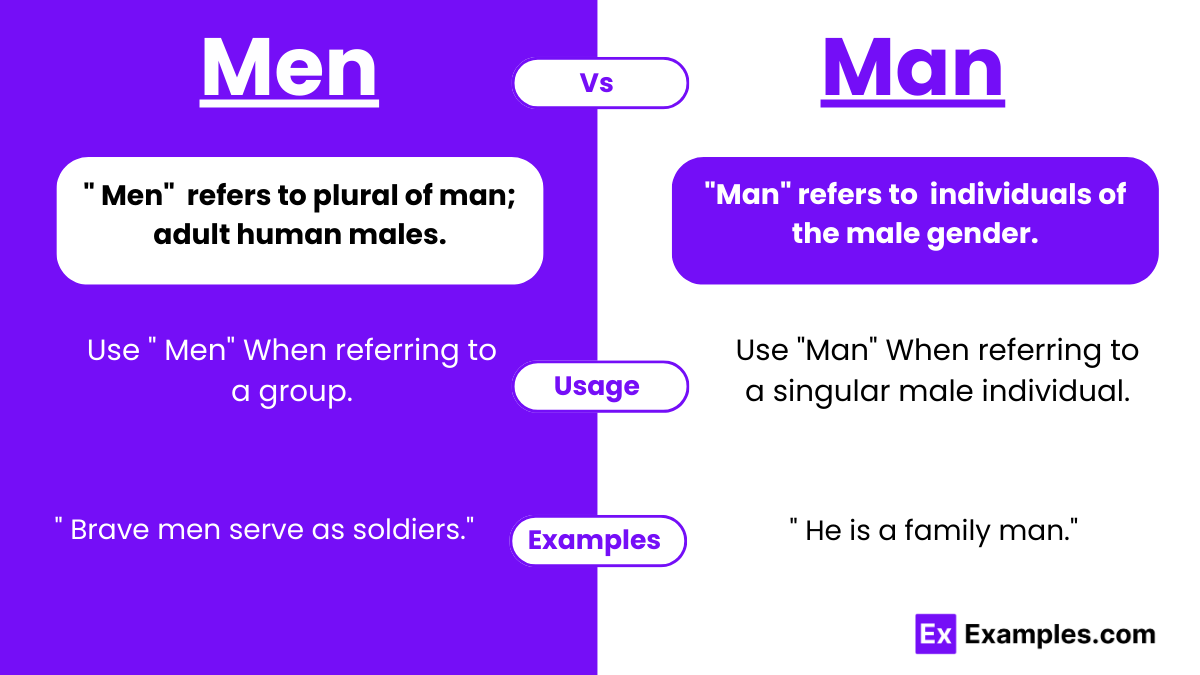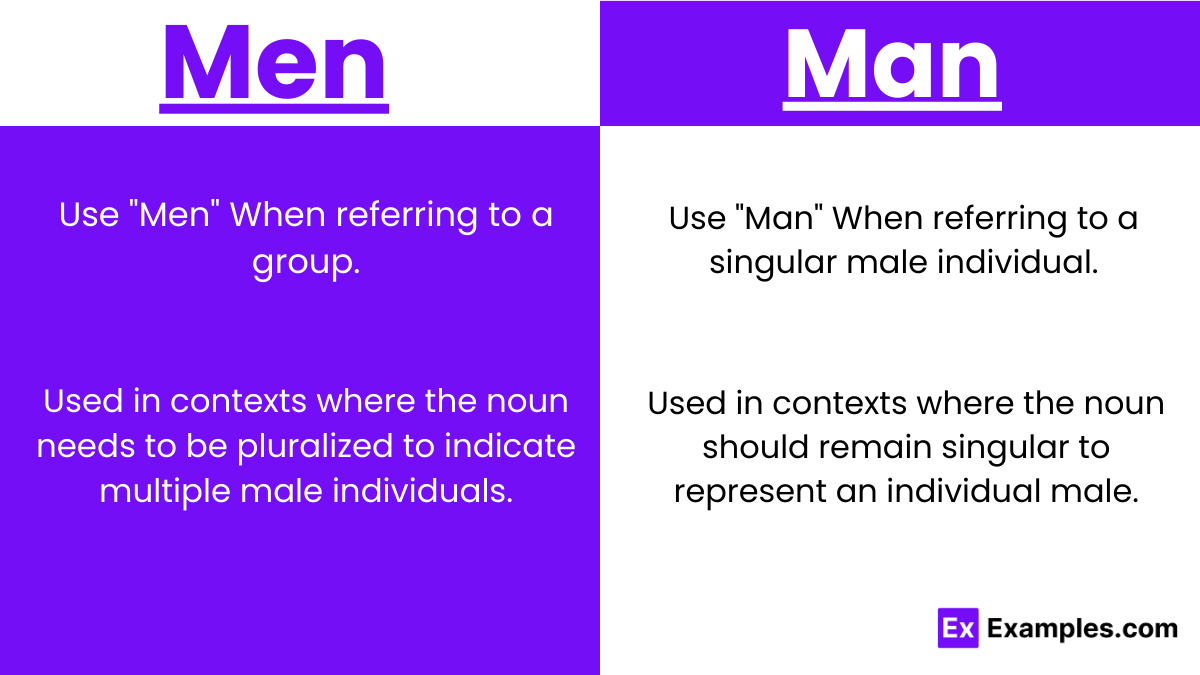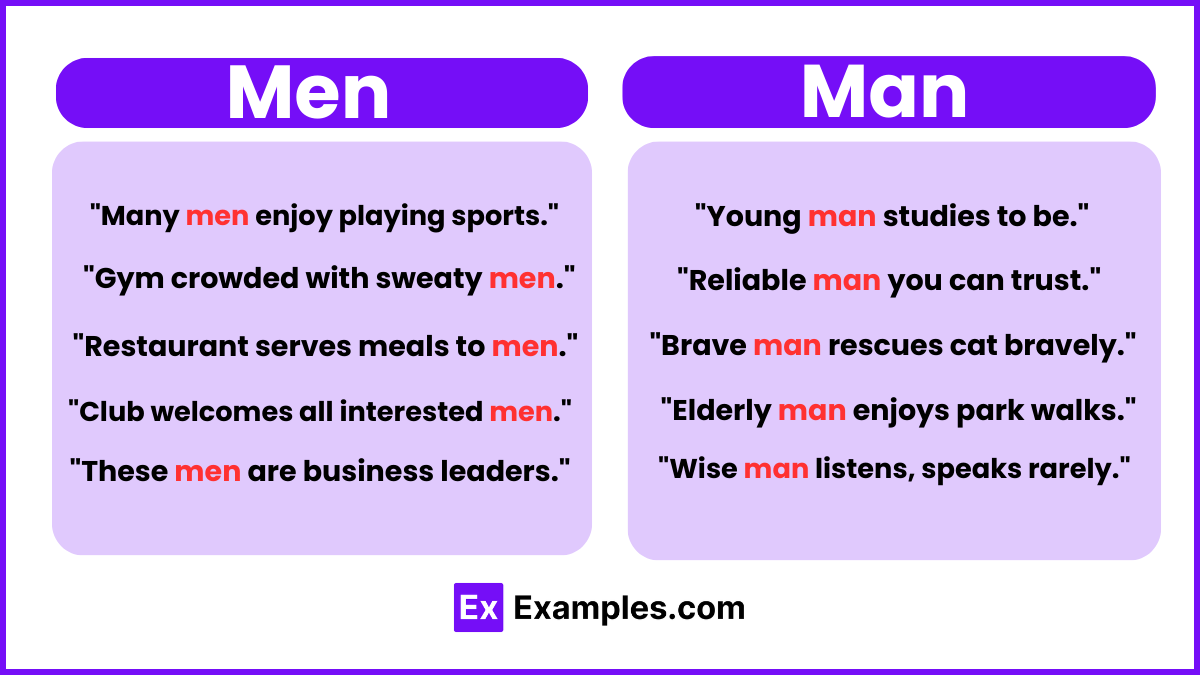Men vs Man
“Dive into the comprehensive guide on ‘Men vs Man’ and unravel the intricate nuances with practical examples. Explore how these terms impact communication dynamics, societal perceptions, and personal identity. Gain clarity on distinguishing between ‘Men’ as individuals of the male gender and ‘Man’ as a broader concept encompassing qualities like maturity and responsibility. Enhance your understanding of language usage and societal constructs within the realm of communication.”
Men vs Man – Meanings
- “Men” refers to adult human males, typically distinguished by biological and physiological characteristics such as anatomy . In societal contexts, “men” often conveys attributes associated with masculinity, such as strength, leadership, and responsibility. It denotes a specific gender identity within the binary framework of male and female.
- “Man” encompasses encapsulating qualities associated with maturity, societal roles, and personal characteristics. While “man” can refer to adult human males, it also extends to denote individuals who embody traits like wisdom, courage, and integrity, regardless of gender. In linguistic terms, “man” often represents humankind or humanity as a whole, transcending gender-specific connotations.
Summary
“Men” denotes adult human males, highlighting biological attributes and societal roles associated with masculinity, while “Man” encompasses broader qualities of maturity and character, extending beyond gender to include traits like wisdom and integrity. While “Men” specifically refers to male individuals, “Man” can represent humanity as a whole, emphasizing qualities irrespective of gender. These terms navigate the complexities of gender identity and societal constructs, influencing communication dynamics and personal perceptions within various contexts.
How To Pronounce Men and Man
How to Pronounce “Men”
- Pronounced as [men].
- The pronunciation starts with the consonant sound [m], followed by the short vowel sound [e], similar to the “e” in “pen.”
- The pronunciation ends with the nasal consonant sound [n].
How to Pronounce “Man”
- Pronounced as [man].
- The pronunciation starts with the consonant sound [m], followed by the short vowel sound [a], similar to the “a” in “cat.”
- The pronunciation ends with the nasal consonant sound [n].
Differences Between Men and Man
| Aspect | Men | Man |
|---|---|---|
| Quantity | Plural form of adult human males | Singular form of adult human male |
| Gender | Specific to male individuals | Can refer to individuals regardless of gender |
| Context | Typically used to denote a group of males | Can refer to an individual or humanity as a whole |
| Connotation | Emphasizes gender identity and collective masculinity | Emphasizes maturity, character, and individuality |
How to Remember the Differences Between “Men” and “Man”
Quantity Reminder:
- “Men” represents plural, indicating multiple adult males.
- “Man” is singular, denoting a single adult male or humanity collectively.
Gender Association:
- Associate “Men” with male gender identity and collective masculinity.
- Connect “Man” with individuality, maturity, and character traits beyond gender.
Contextual Usage Trick:
- Use “Men” when referring to groups or categories of male individuals.
- Implement “Man” when addressing singular male individuals or humanity as a whole.
Plurality vs. Singularity:
- Remember “Men” for plural situations involving multiple males.
- Recall “Man” for singular instances referring to individual males or humanity.
When to Use Men and Man
Usage of “Men”
- When referring to a group or collective of adult males.
- In contexts where the noun needs to be pluralized to indicate multiple male individuals.
- For instances involving discussions, categories, or representations of male gender as a whole.
Usage of “Man”
- When referring to a singular adult male individual.
- In contexts where the noun should remain singular to represent an individual male or humanity as a whole.
- For situations focusing on personal attributes, maturity, or character traits attributed to an individual male.
Men and Man Examples
Examples of “Men”
- The conference room was filled with influential men.
- Many men enjoy watching football on Sundays.
- The team consists of talented men from diverse backgrounds.
- The gym is always busy with men lifting weights.
- These men are dedicated to their professions and families.
Examples of “Man”
- That man is known for his generosity and kindness.
- He is a wise man who offers valuable advice.
- The man sitting in the corner is reading a book.
- Every man must take responsibility for his actions.
- The young man is learning to drive a car.
Synonyms For Men and Man
| Men | Man |
|---|---|
| Males | Male |
| Guys | Gentleman |
| Dudes | Fellow |
| Gentlemen | Individual |
| Blokes | Person |
| Fellows | Human |
Exercise
Instructions: Fill in the blanks with the appropriate word, “men” or “man,” to complete each sentence correctly.
- The conference room was filled with influential _______________.
- Many _______________ enjoy watching football on Sundays.
- The team consists of talented _______________ from diverse backgrounds.
- The gym is always busy with _______________ lifting weights.
- These _______________ are dedicated to their professions and families.
Answers:
- men
- men
- men
- men
- men
FAQ’S
Is the men singular or plural?
“Men” is plural, referring to multiple adult male individuals. It denotes a group or collective of males, contrasting with “man,” which is singular, indicating an individual male.
Is “man” considered a singular noun?
Yes, “man” is considered a singular noun when referring to an individual adult male. It contrasts with “men,” which is the plural form indicating multiple adult males.
Can “man” be used to refer to multiple individuals?
No, “man” is typically used as a singular noun to refer to an individual adult male. To denote multiple adult males, the plural form “men” is used instead.
Why do people use man in sentences?
People use “man” in sentences to refer to individual adult males or humanity as a whole, emphasizing personal attributes, roles, or societal constructs associated with masculinity and maturity.




